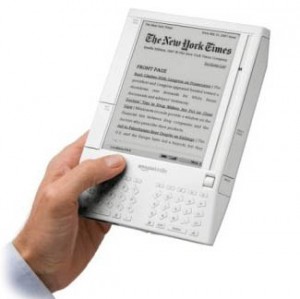In 1985, when I moved into my first apartment, my first order of business was to subscribe to The New York Times. My Sunday ritual was comforting; make a pot of coffee and relax while reading the Times from cover to cover. I saved the crossword for my hour-long commute into the city each day. It was a ritual carried over from growing up in my family of eight. My six siblings and I raced each other to the front porch each Sunday to get first shot at the papers. We shared the different sections, read comics aloud and discussed the articles and gossip. A few hours later our dad swore like a sailor because the family room was a mess of newspaper sections that he would have to put back together, in order, before enjoying the paper himself.
As I became older and busier, I found myself with less time to read the Sunday paper. Eventually they piled up for weeks, unread. Finally, with much reluctance, I canceled my subscriptions and began reading the news online. Ditto magazines, which are fighting with books for my attention during those precious couple of hours I have to relax at the end of the day. Meanwhile, I have cases of books in my garage, unpacked since our move here eight years ago. I also have stacks and stacks of books in our bedroom. Our house is too small for bookshelves and too crowded for stacks of books.
Thanks to the Internet and electronic or digital readers such as the Kindle, all our books and subscriptions are available to us in one easy to hold tablet. There’s no pile of magazines in the bathroom, and the family room end table isn’t stacked high with books. Wireless reading devices are easy to take on planes and commutes and aren’t as heavy or cumbersome as a Sunday paper or Stephen King novel.
This all has me thinking about the future of reading….
Books v. Internet
Yesterday, on Twitter and at the Freelance Writing Jobs Facebook Group, I asked: “If you had to choose between books or the Internet which would win?” The answer, hands down, was books.
This surprised me.
In our hypothetical world, I think “books” is the easy answer. If faced with this dilemma in real life, it’s more complicated. For example, books aren’t our livelihood. As a writer, blogger and social media consultant, there’s no question about what I’d choose. I can’t go to Starbucks or the library every time I want to work. I can do some work offline, but only some. Asking me to give up an Internet connection is basically telling me to go back to an office job.
Giving Up Books & Magazines v. Giving Up Reading
Truthfully? Many of us don’t subscribe to magazines and newspapers anymore because it’s cheaper and easier to get our news online. We don’t have to deal with wrapping up our recycling or the clutter left behind by periodicals. While I do have some treasured volumes, it’s not so difficult for me to give up books at all. I’m not giving up reading, just the way I read.
But this isn’t about books v. the Internet. This is about how we’re going to read in the future.
As the daughter of a librarian, I can tell you that books are a precious resource. If we don’t buy and read books, authors lose money, publishing houses lose money, libraries will close and more. However, we’re finding ways to get around some of it, for example the aforementioned electronic reading devices.
I grew up with books. There wasn’t a day you couldn’t find me with my nose buried in a novel or biography. I understand how books can comfort. Mr. Ng, on the other hand, didn’t grow up around books. His parents weren’t avid readers and they didn’t encourage reading. Mr. Ng is happy to electronically digest his information, more so than someone who grew up in a family of readers. The words are the same, the only thing that’s different is the manner in which their presented.
While I enjoy watching my son read each day, I know that as his generation gets older and new generations come along, they’re more likely to embrace electronic forms of reading over paper. Books will become antiques and print publishers will primarily publish online. I’m sure we’ll still have physical copies in our hands to hold for quite some time, but as more people embrace gadgetry and fewer people buy books, magazines and newspapers, eventually these will all phase out. That’s my prediction anyway. I don’t know if it will happen completely during my lifetime, but it’s going to happen. We’re living in a time when convenience is king and paperless is the way to go. Our kids, their kids, and their grandkids, won’t cherish books and newspapers as we did.
Remember vinyl?
Mixed Emotions
To be honest, I’m not sure how I feel about all this. I love books, it’s in my blood. However, I don’t miss newspapers and I’ve knocked down the amount of magazines I subscribe to. My background is in publishing, so I do understand the implications of all this. I’m just happy to read and if I can do that with one device instead of a houseful of books, it’s something I can live with.
I choose to embrace change rather than to fight it.
What do you think? What is the future of reading?


Leave a Reply